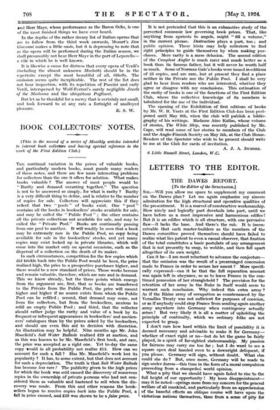BOOK COLLECTORS' NOTES.
(This is She second of a series of Monthly articles intended to interest book collectors and having special reference to the work of the First Edition Club.) THE continual variation in the prices of valuable books, and particularly modern books, must puzzle many readers of these notes, and there are few more interesting problems for collectors than the one it offers for solution. What makes books valuable ? The answer of most people would be Rarity and demand occurring together." The question is not to be answered so simply, for What is rarity ? Rarity is a very difficult thing to define, and is relative to the number of copies for sale. Collectors will appreciate this if they reflect that two " pools " of books exist. One " pool " contains all the books in booksellers' stocks available for sale, and may be called the " Public Pool " ; the other contains all the private collections not available for sale, and may be called the " Private Pool." Books are continually passing from one pool to another. It will readily be seen that a book may be extremely rare in the Public Pool, no copy being available for sale in the booksellers' stocks, and yet many copies may exist locked up in private libraries, which will come into the market only on special occasions, such as the dispersal of a collection on the death of its maker.
In such circumstances, competition for the few copies which did trickle back into the Public Pool would be keen, the price realized high, the price to a prospective purchaser higher, and there would be a new standard of prices. Those works become and remain valuable, therefore, which are rare and in demand. This we know already, but the three points which emerge from the argument are, first, that as books are transferred to the Private from the Public Pool, the price will mount higher and higher if no source exists from which the Public Pool can be refilled ; second, that demand may come, not from the collectors, but from the booksellers, anxious to refill an empty Public Pool ; and third, that the collector should rather judge the rarity and value of a book by its frequent or infrequent appearances in booksellers' and auction- eers' catalogues than by the 'prices asked by the booksellers, and should use even this aid to decision with discretion. An illustration may be helpful. Nine months ago Mr. John Masefield's Salt Water Ballads realized £29 at auction, and as this was known to be Mr. Masefield's first book, and rare, the price was accepted as a right one. Yet to-day the same copy *rould in all probability not realize £15. How can we account for such a fall ? Has Mr. Masefield's work lost its popularity ? It has, to some extent, but that does not account for such a depreciation. The truth is that Salt Water Ballads has become less rare ! The publicity given to the high prices for which the book was sold caused the discovery of numerous copies in the ownership of private persons who had not con- sidered them as valuable and hastened to sell when the dis- covery was made. From this and other reasons the book- sellers began to receive copies back into the Public Pool, a fall in price ensued, and £29 was shown to be a false price.
It is not pretended that this is an exhaustive study of the perverted economic law governing book prices. That, like anything from apricots to angels, might " fill a volume," in the current phrase. Destruction plays a part, too ; and public opinion. These hints may help collectors to find right principles to guide themselves by when making pur- chases. Mere rarity is a mere delusion. The second edition of the Onnpleat Angler is much rarer and much better as a book than its famous father, but it will never be worth half as much. Some of Norman Gale's books were issued in editions of 25 copies, and are rare, but at present they find a place neither in the Private nor the Public Pool. I shall be very glad to hear from readers who are interested, whether they agree or disagree with my conclusions. This estimation of the rarity of books is one of the functions of the First Edition Club, where the collective knowledge of its members is tabulated for the use of the individual.
The opening of the Exhibition of first editions of books- by Mr. W. B. Yeats at the First Edition Clubthas been post- poned until May 8th, when the club will publish a biblio- graphy of his writings. Madame Aino Kailas, whose volume of stories, The White Ship, was recently published by Mr. Cape, will read some of her stories to members of the Club and the Anglo-Finnish Society on May 5th, at the Club House. Readers of the Spectator who wish to be present should write to me at the Club for cards of invitation.
A. J. A. Srmoris.
6 Little Russell Street, London, W.C.














































 Previous page
Previous page